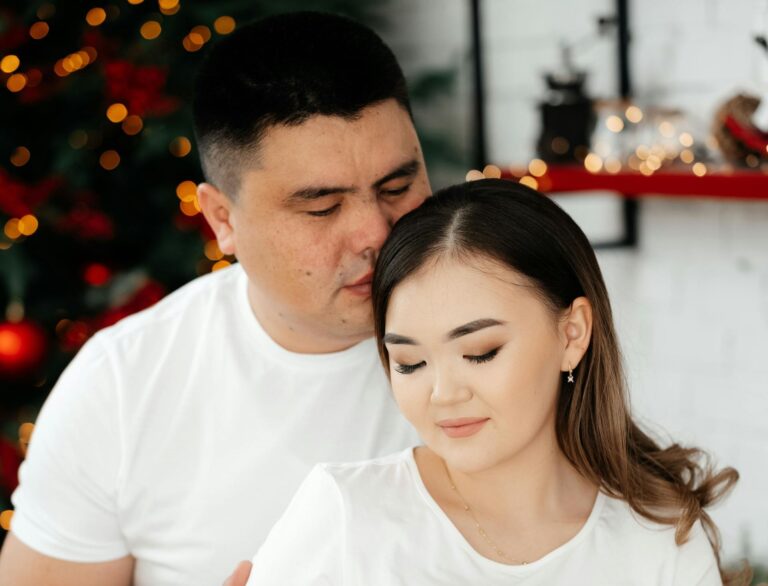⚠️ Alert! Don’t Miss These Red Flags When Dating an Older Man
Are you dating an older man?
Or did you find yourself falling for an older man?
If being in a relationship with an older man is your new fantasy then you’re at the right place.
Honestly, there’s nothing taboo about it even if you’re a young woman in your late teens or early 20s.
Age is just a number when it comes to Love and everyone has the right to be loved regardless of age.
The most important thing in love is staying loyal to your partner and overcoming challenges together.
Despite the perks of dating an older man, there are certain red flags to look for when you’re dating an older man.
Sometimes, these red flags and their truth is right before your eyes – easy to spot.
but…you‘re blinded by love.
Because of your intense emotions for your partner, you tend to ignore all the warning signs.
Maya Angelou once said, “When people show you who they are, believe them because they know themselves much better than you do.”
But don’t worry, in this article, I’ll be sharing with you 16 red flags you should know when dating an older man and why ignoring some of them can emotionally harm you.
You’ll also find tips on dating older man to help you have a wonderful relationship with your partner.
Love in the Fast Lane? Beware These 16 Red Flags When Dating an Older Man

Resistance To Change
The concept of resistance to change often emerges as a subtle yet significant aspect.
When it comes to dating, an individual’s mentality can shape the entire dynamic. The closed-offness to new perspectives can be likened to a red flag, signaling potential challenges ahead. This “take me or leave me” perspective, while rooted in authenticity, can inadvertently hinder personal growth and the evolution of a relationship.
The resistance to change itself is a complex phenomenon. It’s not merely a matter of being flawed or resistant; it’s also about the perspective one holds.
Older men, in particular, might exhibit a sense of deep work that they have undertaken over time. This experience can lead to a certain level of complacency, where the comfort of routine and habit becomes ingrained. While this might seem reassuring on the surface, it can hinder the room to grow, both individually and within a relationship.
The essence of change lies in acknowledging that flaws and imperfections exist within us all. Embracing change requires recognizing that there is always room to improve, both as an individual and as a partner in a relationship.
In this context, resistance to change becomes more than a mere habit; it’s a mindset that limits the potential for growth, understanding, and shared experiences.
The dating landscape unveils a dynamic interplay between perspectives and resistance to change.
A “take me or leave me” mentality might serve as a red flag, indicating the need for deeper exploration.
While older men can bring a wealth of experience, the challenge lies in maintaining a balance between the deep work done and the openness to continued growth.
The journey towards a fulfilling relationship involves acknowledging flaws, embracing change, and fostering an environment where room to grow is cherished above all.
Unapologetic

When dating, particularly with an older man, it’s crucial to be attuned to potential red flags that may emerge. These flags can manifest in various forms, and one notable aspect is the individual’s unapologetic disposition.
An older man’s pride and ego can sometimes hinder his willingness to engage in apologizing, even when it is warranted. This dynamic can lead to a turn-off in the relationship, especially when offenses occur.
However, amidst such tendencies, there remains a beacon of hope. A relationship’s foundation can be fortified when both parties possess the capacity to acknowledge their missteps, accept responsibility, and extend genuine apologies. This approach forms the bedrock of mutual growth and understanding.
Errors and misjudgments are intrinsic to human interactions. Building upon these mistakes is possible when there exists a willingness to take responsibility and mend what might have faltered. Yet, if an older partner remains unwilling to recognize their misdeeds, or if they persist in acting poorly or selfishly, the prospects of nurturing a sustainable connection diminish.
At the heart of any successful relationship lies respect. It is the glue that binds partners together and facilitates healthy communication and growth. In conjunction with respect, humility plays a pivotal role. Demonstrating humility by admitting when one is wrong fosters an environment conducive to open dialogue and constructive progress.
He Gaslights You
A vital aspect often overlooked is the concept of gaslighting. When someone you’re involved with employs gaslighting tactics, it shakes the very foundation of reality and trust within the relationship. The consistency that forms the basis of a healthy connection becomes compromised, ultimately eroding the trust that has been built over time.
Gaslighting is a red flag that one should never ignore when dating someone new, regardless of their age or background. Young people and older men alike can fall into this pattern. It involves manipulating the truth, creating a stark contrast between what is said and what is actually done. When confronted, gaslighters are skilled at flipping the situation, making it seem as though their partner is overreacting or making a big deal out of nothing.
The toll of gaslighting on one’s mind should not be underestimated. It can lead to a profound sense of confusion and self-doubt, leaving the victim questioning their own perceptions. The essence of a healthy relationship rests on a foundation of trust, where actions and words align seamlessly. An essential part of this foundation is the acknowledgment of mistakes and the willingness to apologize when necessary.
In contrast, gaslighting involves pretending that the initial promises or statements were never made, further deepening the chasm between reality and the false narrative that’s being spun. This practice chips away at the trust that a relationship is built upon, leaving one feeling like they’re losing not only their sense of reality but also their agency within the partnership.
When He Uses The Word “Separated”
While dating, particularly when dealing with an older man, the choice of words can hold significant weight. Among these words, the term “separated” might seem innocuous at first glance, but it can carry a deeper meaning. If an older man you’re dating uses the word “separated,” it’s crucial to exercise caution and pay careful attention to this aspect.
When an older man claims to be “separated,” it’s essential to understand the context behind the term. Often, this word implies that he is still legally married, despite being physically apart from his spouse. While hopes for a genuine and long-term connection might arise in the dating process, it’s advisable not to let your expectations soar prematurely. Delving into a relationship with an older man who is still in a legally binding marriage can present complexities that might not align with your comfort level or long-term aspirations.
Advice to approach this situation with mindfulness is paramount. Older men, as a demographic, might not always communicate all the information upfront, inadvertently leaving crucial details undisclosed. This might not necessarily be an act of deception, but rather a guarded approach to protect their own emotions or the emotional landscape of those involved. In such cases, it becomes crucial to be diligent in your dealings and not to be afraid to ask clarifying questions.
One must recognize the importance of protecting one’s heart and well-being in the dating journey. Older men, just like anyone else, might use certain words with specific intentions, and it’s essential to differentiate between genuine intentions and potential misleading tactics. If you find yourself in a situation where an older man’s words don’t align with his actions, it’s a red flag that should not be ignored. Protecting your emotions and seeking clarity is an act of self-care that can lead to healthier, more fulfilling relationships.
He Wants To Get Married ASAP
A man’s intentions can be veiled beneath a layer of surface actions and words. Particularly when it comes to older men, the desire for marriage might manifest swiftly, often accompanied by proposals that carry weighty implications. As we delve into the realm of marriage, the intricate tapestry of one’s past, including kids and previous love life, adds complexity to the decision-making process.
In this context, the term “ASAP” raises both curiosity and caution. While the intention to move swiftly might stem from genuine affection, it’s essential to discern whether this haste is aligned with a deeper connection or motivated by other factors. The advantage of being informed about the man’s past experiences and motivations cannot be overstated. Acquiring this information allows for a well-rounded understanding that paves the way for a quality decision.
However, there are instances when the signs point toward potential red flags. Desperation, whether driven by a ticking biological clock or a sense of availability, can inadvertently lead to rushing into commitments. The act of taking advantage of such circumstances is a practice that should not be ignored. Being discerning amidst the rush is imperative, especially when considering proposals that seemingly materialize in a fleeting moment.
He Has A Negative Attitude Toward Love
There’s an old saying: “Have been there, done that.” This saying becomes particularly relevant when considering the attitudes that some older men may carry towards love. These attitudes are often the result of past experiences, including interactions with girlfriends and wives.
For some older men, their attitudes have been shaped by emotional wounds inflicted by past relationships. Experiences of being cheated on, lied to, or manipulated can leave lasting impressions, leading to emotions such as resentment, bitterness, and anger. These negative feelings can become deeply ingrained, impacting their perspective on women and love.
As these men navigate the dating landscape, their attitudes might manifest in ways that affect the dynamics of their interactions. The passage of time does not necessarily guarantee emotional healing; wounds can persist, even if they remain hidden beneath the surface. These individuals must recognize the need to work on themselves, addressing their emotional wounds to foster a positive and healthy attitude toward love.
For those engaging with older men in the dating arena, it’s crucial to be discerning and mindful. Being aware of the signs that indicate a negative attitude towards love can help individuals protect their own emotional well-being. While these men might be genuinely seeking companionship, it’s important to watch out for indications of unresolved negative feelings or emotional unavailability.
He’s Depressed

It is imperative to recognize the complexities that older men can bring to the table. While their life experiences and maturity can enrich relationships, it’s essential to be attuned to potential red flags, such as signs of depression. This often-overlooked facet can significantly impact the dynamics of a budding connection.
Many older men silently grapple with inner battles, their self-esteem eroded by a myriad of reasons. Life’s twists and turns, including divorces, financial hardships, and a sense of purposelessness, can contribute to feelings of being stuck and confused. As they navigate the intricate landscape of dating, these underlying emotions can play a pivotal role.
Depression, whether overt or subtly manifested, can cast a shadow over the connections they forge. Such individuals might carry a sense of being low, emotionally and mentally, making genuine engagement challenging. The weight of these feelings might lead to difficulty in expressing themselves authentically and openly.
For those considering forming a connection with an older man, it’s essential to gauge whether you’re up for the challenges that might accompany dating someone who is dealing with depression. The decision to embark on this journey should be well-informed and aligned with your own emotional capacity. It’s advisable to introspect and consult your own feelings, especially if signs of depression are evident.
As you engage with the complexities of dating an older man, remember that your well-being and emotional comfort are paramount. If you find that the challenges presented by depression are beyond what you’re equipped to handle, there’s no shame in looking elsewhere. Ultimately, a fulfilling relationship should be built upon mutual support, understanding, and shared emotional well-being.
He’s Still Emotionally Attached To His Wife Or Ex.
Navigating the complexities of relationships often entails understanding the intricate emotions that individuals bring to the table. For many women, it’s not uncommon to encounter scenarios where a boyfriend’s emotional connections to his ex-wife or ex-partner continue to hold sway. The realm of emotions is nuanced, and recognizing the signs of such attachment is vital in establishing a genuine and harmonious bond.
Instances, where messages and communication between a boyfriend and his ex are frequent, can be indicative of an underlying emotional current. The attention and contact maintained suggest a connection that extends beyond mere friendship. Such scenarios might evoke concerns, prompting one to consider whether the past still holds an emotional grip on the present.
In these situations, it’s important to acknowledge the validity of the emotions involved. The experience of witnessing ongoing contact between a boyfriend and his ex might elicit various feelings, ranging from curiosity to insecurity. However, it’s crucial to approach these scenarios with empathy and open communication, rather than jumping to conclusions.
While acknowledging the ex’s role and the emotional history shared is essential, it’s equally important to establish healthy boundaries. Recognizing that a boyfriend’s past connections hold a space in his life is a step towards understanding. Creating an environment where these connections are respected yet appropriately placed can contribute to a balanced and thriving relationship.
It’s worth noting that the presence of emotional attachment doesn’t inherently make a person an enemy to their ex. The complexities of emotions are often intertwined, and the path to healing and growth involves addressing these emotions with sensitivity. Addressing the underlying currents is a journey that requires patience and mutual understanding.
Make You Feel Embarrassed
The dynamic between a man and a woman often involves a delicate balance of emotions and interactions. When embarking on the journey of dating and establishing a relationship, vulnerability becomes a pivotal element. Expressing one’s thoughts, feelings, and insecurities is a courageous act, as it opens the door to deeper connections and understanding.
However, the nuances of this interaction can take an unexpected turn. Imagine finding yourself in a situation where the very act of vulnerability, rather than being met with empathy, makes you feel embarrassed, insecure, or even judged. The emotional resonance of such an experience can be challenging to navigate. It can lead to a sense of unease and internal conflict, impacting the organic growth of the relationship.
Feeling embarrassed or judged in the presence of the person you’re sharing your vulnerability with is a tough predicament. The journey of building a strong foundation becomes more challenging when the act of exposing your authentic self is met with feelings of shame or inadequacy. In essence, the hardest thing in a relationship is to open up and express your innermost thoughts and feelings, and when this vulnerability isn’t met with acceptance and understanding, it can have far-reaching effects.
The proximity between two individuals in a relationship carries immense power. As you become really close to someone, their influence on your emotional landscape increases. Their reactions, responses, and demeanor hold sway over how you think, feel, and even believe about yourself. This connection holds the potential to uplift and nurture, but it can also impact one’s self-perception in ways that aren’t always positive.
Vulnerability is a two-way street. A healthy and nurturing relationship encourages openness and authenticity without causing feelings of embarrassment or insecurity. Striking a balance between influence and empathy is crucial. When the relationship is founded on mutual respect and emotional safety, both individuals can express themselves without fear of judgment, creating an environment that fosters growth and genuine connection.
Peter Pan Syndrome
The concept of Peter Pan Syndrome emerges as an intriguing phenomenon. This syndrome highlights the idea that emotional maturity doesn’t always correspond with age. It sheds light on the existence of older men who, despite their years, find themselves entrapped in patterns of behavior reminiscent of their youth.
These individuals, affected by the Peter Pan Syndrome, display tendencies that reflect a resistance to growing up. They remain tethered to the impulsive behaviors and habits of their younger selves, unable to fully embrace the responsibilities that come with age. This syndrome becomes particularly evident in cases where older men seem unable to cultivate emotional maturity that aligns with their chronological age.
Aspects of the Peter Pan Syndrome manifest in various ways. This could include tendencies to gaslight or guilt trip their partners, indicating a lack of emotional accountability. Financial recklessness might also be present, highlighting an inability to manage spending habits effectively. These behaviors, reminiscent of youthful impulsivity, can impact relationships and emotional well-being.
Furthermore, the syndrome’s grip might lead to challenges in taking responsibility for one’s actions. Mistakes may be dismissed or overlooked, perpetuating an atmosphere of immaturity. This can become even more concerning when such behaviors manifest in the context of dating, particularly when someone’s boyfriend exhibits these traits.
Individuals grappling with the Peter Pan Syndrome might find themselves trapped in a cycle of emotional immaturity. The struggle to let go of past habits and adopt a more responsible demeanor can be likened to being stuck in a loop. This internal conflict can contribute to destructive patterns and hinder personal growth.
As partners engage with those affected by the Peter Pan Syndrome, it’s crucial to approach the situation with empathy and understanding. Recognizing the challenges and complexities these individuals face can pave the way for meaningful discussions. Encouraging them to take steps towards emotional growth, whether it’s learning to clean up after themselves or taking responsibility for their actions, is a compassionate approach.
The See-Saw Effect
The See-Saw Effect represents a delicate dance, particularly in the context of dating a man in his 40s who carries the responsibilities of parenthood and the challenges of midlife. This effect epitomizes the equilibrium required to harmoniously integrate various aspects of life while nurturing a thriving connection.
Dating during the midlife years demands a unique balance, especially when kids, work, and obligations pull at a man’s time and attention. The intricacies of navigating these commitments can influence the dynamics of the relationship. Maintaining a steady equilibrium becomes pivotal, allowing both partners to coexist in a space that acknowledges each other’s obligations without overshadowing the intimacy they share.
For a relationship to flourish amidst the See-Saw Effect, respecting the man’s schedule and commitments is vital. It is imperative to recognize the demands that midlife brings and honor his ability to fulfill various roles. This acknowledgment demonstrates a deeper level of understanding and appreciation for the intricate web of responsibilities he manages.
However, while respecting his commitments, it’s equally crucial to ensure that the relationship isn’t relegated to a lower priority. The See-Saw Effect, when taken to an extreme, can lead to a scenario where one partner feels sidelined. This is where communication comes into play. Finding the point of balance that allows both individuals to thrive within the relationship while upholding their individual responsibilities is essential.
Yet, a notable red flag emerges if a sense of being ignored or deprioritized persists within the relationship. Every partner deserves to feel valued and appreciated, and when this sentiment falters, it can indicate an underlying issue that shouldn’t be ignored. In such instances, addressing the imbalance and nurturing open dialogue becomes key to restoring equilibrium.
He’s Blameless
Navigating the intricacies of dating an older man can often reveal intriguing aspects of his character, including how he perceives his past relationships. A potential red flag arises when an individual appears blameless in the context of failed marriages or relationships. This demeanor could manifest as a reluctance to acknowledge any contribution to the breakdown of these connections.
In some instances, an older man might exhibit a tendency to attribute fault solely to his ex-wife or past girlfriends. This behavior can be rooted in the desire to shield himself from culpability. Such an outlook, while understandable on a human level, can pose challenges to the dynamics of a present relationship. It can also raise questions about the essential quality of taking responsibility for one’s actions and their consequences.
Accepting responsibility is one of the hardest yet most essential aspects of personal growth. It’s a hallmark of emotional maturity and a willingness to learn from past experiences. When someone approaches life with a blameless perspective, they might inadvertently hinder their own advancement. By acknowledging their contributions, even in the context of past failures, they can create an environment of continuous self-improvement.
A blameless attitude can have far-reaching implications. If an older man hesitates to recognize his role in the challenges of previous partnerships, it might signal a pattern of avoidance or denial. Furthermore, this pattern might extend to the current relationship, where issues could be brushed aside or attributed to external factors.
As a partner in a relationship with an older man, it’s crucial to assess how he handles the concept of fault and responsibility. A willingness to introspect and acknowledge one’s actions fosters an environment of open communication and personal growth. Conversely, if an individual remains blameless and prone to shifting responsibility onto others, it could potentially hinder the growth of both partners.
Does Your Vision For The Future Match Up?
To forge a meaningful connection, the alignment of visions for the future becomes a cornerstone of a successful partnership. As two individuals embark on the journey of building something special, the resonance between their aspirations can shape the trajectory of their shared experiences.
Engaging in an open and serious conversation about the future is not just a matter of idle curiosity but a crucial step towards understanding compatibility. This discourse delves into pivotal topics that encompass plans for family, the willingness to relocate or explore new horizons through travel, and the idea of supporting each other’s goals.
A shared vision for the future goes beyond the physical exchange of engagement and wedding rings; it delves into the emotional resonance of goals, ambitions, and the joys that life can offer. This matching of aspirations is a testament to the willingness of both individuals to align their trajectories and share in the happiness and fulfillment that their journey together promises.
Among these topics, the presence of children and the roles they might play in each other’s lives becomes a focal point. The compatibility in desires to nurture a family unit harmoniously integrates with the choice of locations to settle and the adventures to embark upon.
It’s not merely a matter of choosing between engagement rings and wedding rings; it’s about selecting a path where both partners willingly step forward in tandem, ready to seize the opportunities life presents. This willingness is a reflection of their shared truth, where ambitions blend seamlessly and the journey is one of mutual growth and empowerment.
However, as paths unfold, it’s important to acknowledge that individual visions can vary. While one partner might feel their ambitions taking off, the other might sense the culmination of certain endeavors. The key is to recognize that these differences are not red flags, but rather invitations for open dialogue and understanding.
Difference In Communication Style
The world of communication is a nuanced tapestry where unique styles and preferences interweave, resulting in a diverse spectrum of interactions. The term “difference in communication style” encompasses various cases that unfold within the realm of human connections. One striking aspect is how age can play a pivotal role in shaping these distinct styles.
When considering the communication preferences of an older man, a notable divergence often emerges. Some individuals from this demographic might lean towards the warmth and familiarity of a traditional phone call, valuing the genuine connection it fosters. On the other side, the world of texts presents a more contemporary avenue, with its succinct yet expressive nature.
This phenomenon isn’t confined to speculation; it’s a facet that has been observed through firsthand experience. An insightful friend, having overseen the operations of a dating service, stumbled upon fascinating distinctions. These variations in communication style manifested subtly but remarkably across different age groups, such as those in their 30s, 50s, and 70s.
Within this panorama, the advent of technology brings its own unique layer to the narrative. While the 90s generation has already embraced technological advances, not all individuals are equally open to the realm of technology and online dating. This serves as a reminder that preferences encompass a spectrum, and not everyone might align with the digital avenues available.
In the grander scheme of relationships, recognizing and embracing these differences in communication style is a pivotal component of understanding and empathy. Such distinctions, whether they pertain to phone calls or texts, can contribute to the tapestry of connection between two individuals. They provide an insight into one another’s worldviews and a pathway for fostering authentic interaction.
Difference In Sex Drive
A romantic relationship often extend into the realm of physical intimacy, encompassing elements like desire, communication, and compatibility. Among these facets, the topic of “Difference in Sex Drive” emerges as a pivotal consideration, especially when navigating relationships with significant age gaps.
Age can inevitably shape the contours of one’s sexual desires. An older man, bearing the richness of maturity, may find his body’s energies shifting in intricate ways, impacting his preferences and ardor. These variations can sometimes lead to differences in the levels of desire between partners, where one might yearn for more while the other finds contentment in less.
Acknowledging and addressing this divergence in sex drive requires an open and candid dialogue. While it can be a difficult conversation, it is far from a definitive deal breaker. Rather, it’s an opportunity to foster understanding and empathy within the relationship. This conversation serves as a bridge between partners, allowing them to explore their respective needs and articulate their expectations.
Navigating the realm of sexual desires and needs is a journey that demands maturity and sensitivity. The concept of being energetically desirous, whether more or less, is part of the intricate fabric that constitutes human relationships. In this narrative, the notion of maturity takes on a multidimensional significance – not just in age, but also in the depth of understanding one’s partner and oneself.
The key to a harmonious journey lies in the art of openly discussing these nuanced topics. By delving into the realm of desires, by fostering conversations about satisfaction, partners can transcend any initial discomfort and approach these discussions with a spirit of collaboration. The aim is not just to address differences, but to find shared ground where both partners feel cherished and understood.
He’s overly controlling and possessive

It’s natural to want to express affection and protect your partner. However, there’s a fine line between healthy behavior and becoming overly controlling or possessive. In small doses, possessiveness might seem like a sign of affection, a way of showing that you care deeply for your partner. It can even feel protective and endearing.
But here’s where caution is necessary. When possessiveness and controlling behavior go unchecked, they can transform a once-healthy connection into an unhealthy relationship. It’s crucial to recognize this early on and address it before it escalates. Like a bud on a plant, such behaviors need to be nipped in their infancy.
Controlling behavior can manifest in various ways. It might involve trying to dictate your partner’s choices, such as what they wear, who they spend time with, or where they go. This level of dictation and control can be suffocating and detrimental to both individuals in the relationship.
Furthermore, an overly possessive partner might exhibit signs of jealousy, attempting to monopolize your time and energy. While love is undoubtedly the foundation of a strong relationship, it should never be used as a tool for manipulation and control. In a healthy partnership, both individuals should be able to grow, maintain their own interests, and spend time apart without feeling guilty or controlled.






